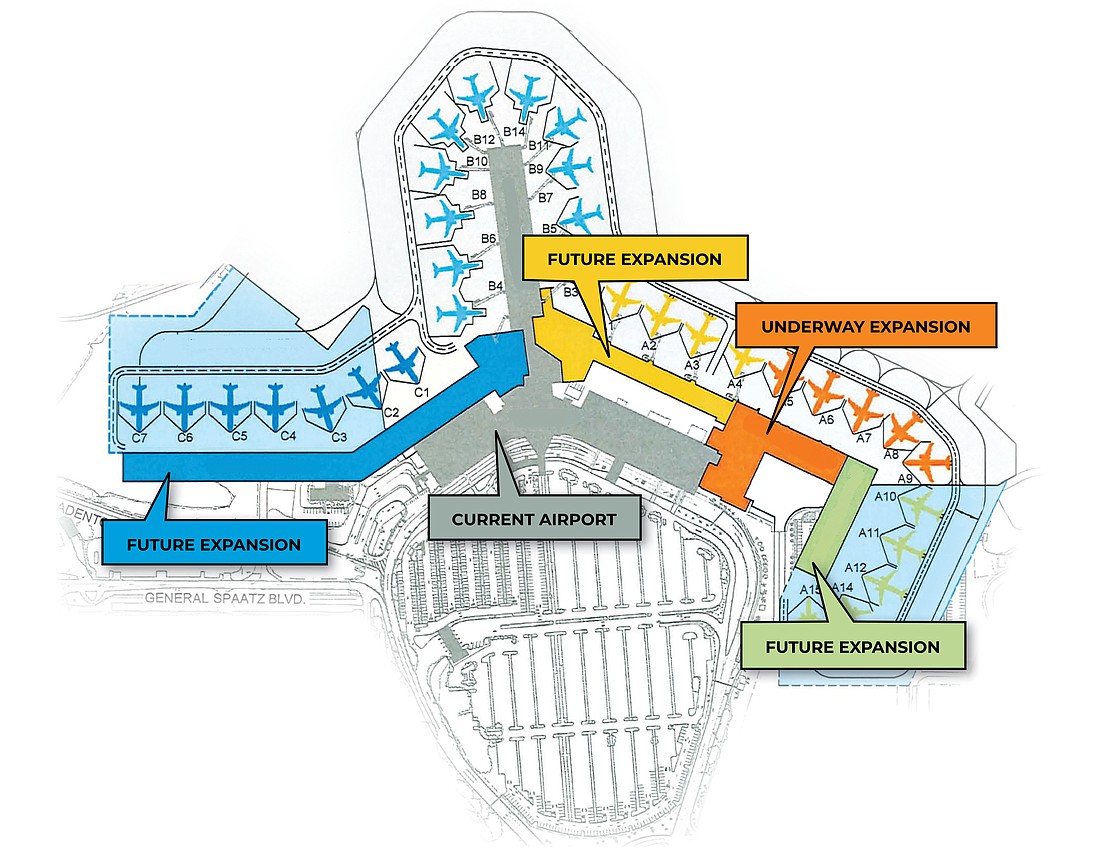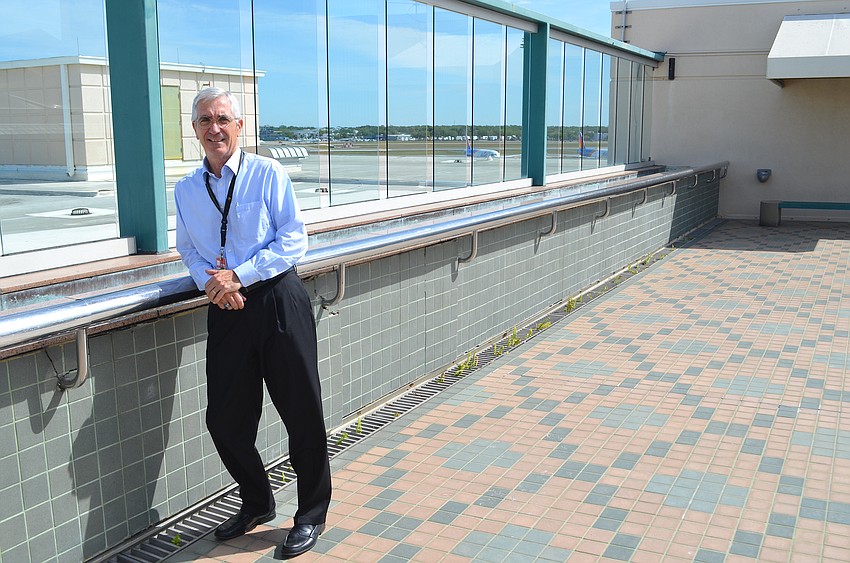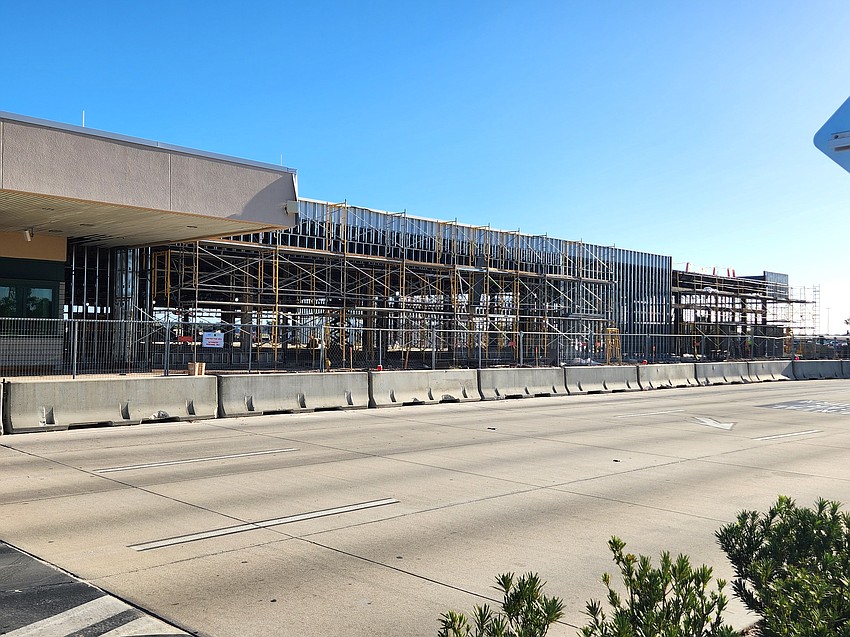- April 11, 2025
-
-
Loading

Loading

For nearly a decade, Sarasota-Bradenton International Airport President and CEO Rick Piccolo has attempted to convince leadership at New College to begin acquiring property it leases from the airport because a failure to do so, he said, threatens the future existence of the school.
Although more than 30 years remain on a 100-year lease for 32 acres that largely comprise New College’s East Campus, Piccolo has warned that now is the time to act while the land on which the college has built facilities can be acquired at a reasonable price.
The Federal Aviation Administration requires that airport property be leased or sold at fair market value.
Piccolo said he can’t forecast what that figure will be in 2056, but estimates rent could run as high as $20 million per year or the price to acquire the land may top $200 million. That’s even assuming the Sarasota-Manatee Airport Authority (SMAA) at that time decides to renew the lease.
“I'm just throwing numbers out there, but it's going to be some astronomical number,” Piccolo said. “I said the state legislature is going to laugh you out of the session and ask why didn't you do any of this beforehand. What I have encouraged the presidents to do every year was look at how would you eat an elephant.
“One bite at a time.”

The lease between SRQ and New College was signed in 1957, at the time for a shopping area to be built, according to Piccolo. Terms included no increase in rent for 50 years with a 50-year option to extend. In 1966, the lease was amended to allow, among other things, the I.M. Pei college housing to be built on the site. That amendment stipulated that the rent be tied to the consumer price index.
“The rent for 32 acres then was $1,300,” Piccolo said. “We’re now up to a whopping $96,000 because the CPI is based on that base rate to begin with.”
That’s still far short of the fair market value the FAA will require at the expiration of the lease.
For years, Piccolo has proposed New College acquire a few acres each year so that by the time the lease expires the college will own 25 of the 32 acres, the remaining seven acres would be part of a land swap with the college. The airport needs those seven acres along General Spatz Boulevard near the north side of the airfield for a future Concourse C as its final expansion to a total of 32 gates.
Piccolo sees it all as a win-win.
“I tried to explain all these business problems, and for all these educated people, they never listened to me,” Piccolo said. “Why not go to the legislature each year, say you need to buy 3 acres of the land and get the $1 million or $2 million, whatever is the appraised value, and buy it down little by little so that when the lease expires, you own the college. We don't want the college. We don't want to destroy the college, but we need to solve this problem.”
In an October 2016 email to then-New College President Donal O’Shea, Piccolo first broached the subject of the school acquiring the property.
“We have pointed out the necessity for New College to begin now in addressing the inevitable expiration of the 1966 lease on Pei Campus, which comprises fully a third of the institution's acreage, and will inexorably necessitate either a large land and building purchase by the college or a significant annual increase in lease payments for both the land and buildings as they revert to the airport,” Piccolo wrote.
All to no avail. Piccolo said he unsuccessfully made the same pitch to O’Shea’s successor, Patricia Okker. Now, though, he has found a receptive audience in Richard Corcoran, the school’s current president who, as former speaker of Florida House of Representatives, has experience in legislative matters such as securing funding to buy the land.
"From day one on campus, Rick Piccolo has been a supportive neighbor to New College,” Corcoran said in a statement. “Not only did Rick reach out to me in my first week in this position, he has been gracious to identify potential challenges for New College related to land use in our future, and he has been a thoughtful partner in identifying solutions together.”
“This isn't the first time I've talked to New College about it, but he's the first guy to understand it,” Piccolo said. “I'm trying to make sure that both the airport and the college can coexist forever.”

One of the fastest growing airports in the country, SRQ has ambitious plans to grow south of the terminal. Decoupling from its longtime status as a “development of regional impact,” the airport authority has recently won rezoning approval from the city of Sarasota to develop nearly 100 acres it owns between the airfield and University Parkway. It plans to use the land for additional parking, a consolidated rental car servicing and storage facility and revenue-generating commercial development.
Currently under construction is a new ground-based boarding concourse with five new gates, which will be Concourse A. The long-range master plan shows an expansion of that facility with five more ground-based boarding gates plus a connector to the existing 13-gate Concourse B, which will include four more jet bridge gates. Finally, Concourse C will bring seven more gates minus one of the current gates that will be lost to that expansion.
John Schussler, who retired as the airport’s properties director in 2018, has sounded a warning that any land transfer to New College would not be in the best interest of the airport authority.
“That land sale of the entire Pei Campus is not in the best long-term interest of SMAA because the airport will need that land someday for passenger terminal related uses,” Schussler wrote. “When the subject of New College came up while I was on the SMAA staff, the general belief was that the 99-year lease made in 1957 was a mistake. I predict that future SMAA staff will think that selling the campus was a worse mistake. Current decision makers may gain at the time that deals are made, but future airport management and airport users will suffer the loss of that land.”
Piccolo said the airport doesn’t need the New College site now or in the future, save for 7 acres for Concourse C, likely decades from now.
Any agreement reached between New College and the airport authority must be approved by the FAA, which not only requires fiscal responsibility of airport operations — hence the mandate to rent or sell land at fair market value — and any land swap.
Piccolo knows he will be long gone by the time the New College lease expires, but even now the college faces significant obstacles if it wishes to build on airport land as that expiration looms on the horizon.
"You're a lessee of mine. I own your land, and I'll own your buildings 30 years from now,” said Piccolo, speaking as the airport authority. “That’s a problem because those buildings have been neglected for so long that when they have to invest and build new facilities there and they have to float bonds, they're not going to be able to get the bonds underwritten. Investors are going say you don't have a lease that goes that long, so there's no guarantee that we'll get our money because you'll be gone.”
And by gone, Piccolo means gone. If unable to purchase the land by 2056, or secure a new lease, he said the school would likely cease to exist.
“The airport's going to own the college, and I can tell you right now, the airport is not going to let New College stay there for $100,000 a year,” he said. “It will demand fair market rent, which means they're going to be leaving, and there will be no New College.”